
The Gathering at Dynamo Open Air 1999, photo Peter Blok
Unless you have lived under a stone, you have heard the voice of Anneke van Giersbergen more than once over the last 25 years. From her early days with The Gathering to her powerful gigs with VUUR last year, the good-humored and open-minded singer has captivated audiences around the world with her unique melodic style. After an American tour lasting from September 19th to October 21st, Anneke will commemorate her 25 years as a performer with two big shows on November 16th and 17th in rock venue Effenaar in Eindhoven. With an extensive interview in two parts, Never Mind The Hype pays tribute to one of the Netherlands’ main musical exports of the last 25 years. In part 1 she talks about topics like early inspiration, getting older as a singer and a person, collaborating with other artists, the reception of VUUR, being on TV, and why she doesn’t tend to look back on her career that much.
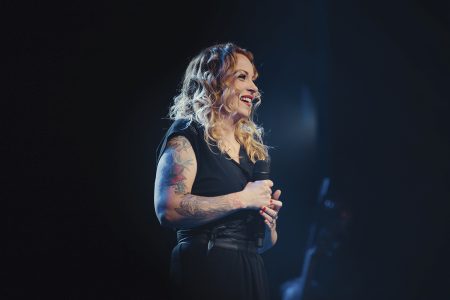
Anneke van Giersbergen in 013, photo Dani Silvia
Be sure to read Part 2 of A random life – 25 years of Anneke van Giersbergen
Words: Mark van Schaick
Photography: Peter Blok (more photo & video on his website), Dani Silvia, Roy Wolters, Rob Sneltjes, Tim van der Steen
Early this year, Van Giersbergen toured the theatres of the Netherlands, playing songs from The Gathering and from her solo projects, as well as material that she recorded with other artists. At the FortaRock festival in June, she received the Buma ROCKS! Export Award from Dutch copyright society Buma, in honour of her contributions to metal and rock music in the Netherlands and the worldwide visibility of the Dutch scene she generated over the course of her career.
I realized that it was almost 25 years ago that I first spoke with Anneke. As a writer for OOR magazine I interviewed The Gathering in 1995 during their tour of the Netherlands. They were doing really well. Album Mandylion – The Gathering’s third and Anneke’s debut with the band – got good reviews at home and abroad, and the single Strange Machines received some pretty decent daytime airplay on the main pop and rock stations.
The Gathering remained one of the Netherlands’ main attractions in rock and metal for many years after. The band and I crossed paths regularly, usually around the release of a new studio album. Sometime after Anneke chose to pursue a solo-career-disguised-as-a-band under the name of Agua de Annique in 2009, I visited her in her brand-new home studio for an article in tech magazine Interface. Her musical vision broadened with each following year, and we have seen her embracing pop, folk, and even children’s theatre along the way. Throughout her 25 years on stage, hard rock, prog rock and metal have remained an unbreakable thread, however. A long string of guest performances bears testimony to her status as a unique singer that lights up every piece of music she lends her voice to. To name but a few of these, I quote her website: “Since striking out on her own in 2007, she has solidified a solo career, recorded and performed multiple times with Canadian metal genius Devin Townsend, and lending her honey-sweet, yet powerful voice to the likes of Anathema, Icelandic folk group Árstíðir, Within Temptation, Ayreon mastermind Arjen Lucassen, Moonspell, John Wetton and Napalm Death.”
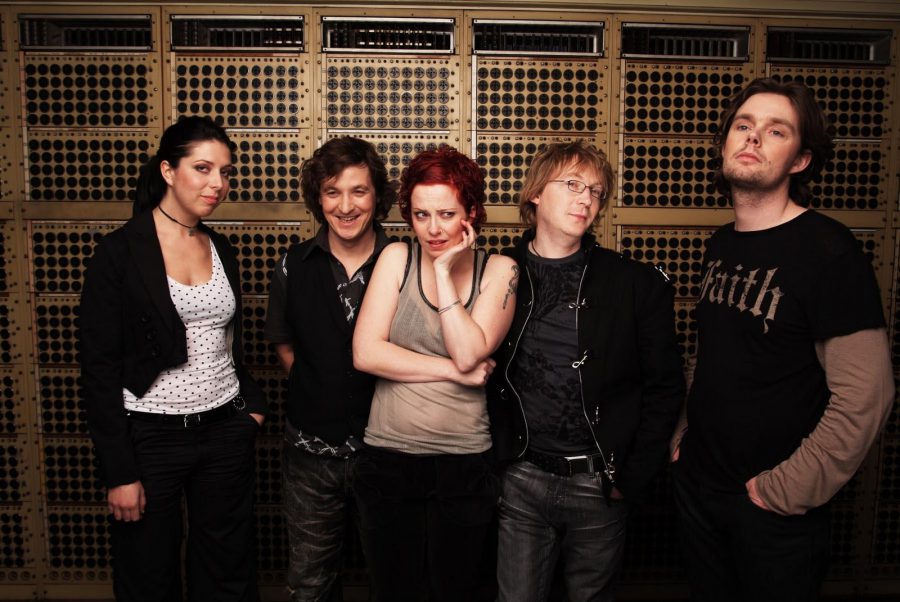
Press shot The Gathering from 2006
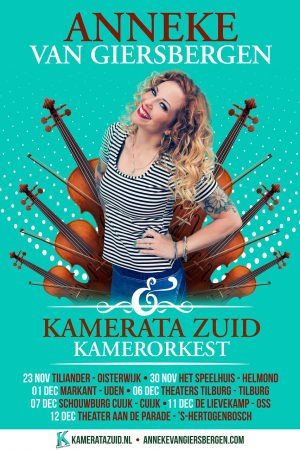 To look back or not to look back, that’s the question
To look back or not to look back, that’s the question
This fall, Anneke may experience her most busy period as a performer ever. From September 19 until October 21 she will tour North America with both Amorphis and Delain. She will perform a solo acoustic set and join Amorphis on stage for their collaborative single Amongst Stars. At the end of November and the beginning of December a very special series of seven concerts await her in the Dutch province of North Brabant, where Anneke was born and raised. A diverse selection of her songs will be performed with Kamerata Zuid chamber orchestra, including a brand new co-write with composer Anthony Fiumara. Before that happens, it is time to celebrate, however. On November 16 and 17 two 25th Anniversary Shows take place in famed venue Effenaar in Anneke’s hometown of Eindhoven. With special appearances by Sharon Den Adel (Within Temptation), Daniel Cavanagh (Anathema) and Kamerata Zuid, these nights promise to be very special indeed. To learn how she feels about her jubilee, and to talk about her life in the past and the present, I met with Anneke in Grand Café Usine in Eindhoven.
You are looking back on 25 years of performing, but in the same time you are the first to say that you don’t look back a lot in life.
“I like to live in the here and now. And I have to think of the future of course, for I have ideas and I have to plan ahead. But to look back… Maybe this is one of my weaknesses, but whenever I look back, I always think that I could have done better. That my performance was not as good as it should have been. I always enjoy myself when I am on stage, I’m in the mood, my voice is doing fine, but afterwards, nine times out of ten, I think: I can do this better tomorrow. It is the same with images: at the moment a photo or video is made I am okay with it, but I’m seldom completely satisfied afterwards. So, for those reasons I don’t tend to look back too much.”
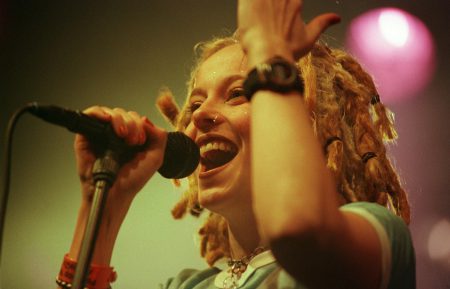
The Gathering 04-04-1999 at Paaspop, photo Peter Blok
Still, in your latest theatre tour you went back to the beginning of your career, even telling stories about the songs’ histories. And you have these two anniversary shows planned in November.
“It was the logical thing to do. Rob (that’s Rob Snijders, Anneke’s husband and manager) looked in the agenda and already a long time ago, he had put the marks at november 2019: 25 years. Because I always start counting from the first gig I did with The Gathering on November 19, 1994. Sure, I did play before that, as a busker, with a speed metal band called Seventh Episode and I had my folk duo. But with The Gathering, things became more professional. So that date was in the agenda, and then Rob said: let’s think of something special. Things started happening in 2018, like the Residentie Orkest asking me for their annual pop music project in The Hague. Which was a great opportunity for me to turn that into a 25 years programme, sort of. It was supposed to be one gig only, but then 013 in Tilburg asked us over for a second night. Which we recorded and made into an album. It all turned out way more elaborate than we imagined it would be.”
So in a way this jubilee was planned…
“…but there is also an element of spontaneity and surprise in it. I was amazed by how many people liked the idea of celebrating 25 years. I was talking to singer Jan Rot last year, when we were doing a show together, and he told me that it was 40 years ago that he first performed at the Paradiso in Amsterdam. Why don’t you celebrate that, I asked? But he immediately said that 25 years is the last anniversary you should celebrate. After that you’re just old, haha. It did make sense when he said that. So, from now on I am old. Which is okay. I like being older. Not all of it, your physique is… well, you have to look after it. But I like not being young anymore. To be a little calmer, a little wiser, more relaxed towards myself and life in general. The insecurity reduces.”

Anneke van Giersbergen in Heerlen, photo Dani Silvia
But then you have to look at your past in such a way that you can deal with it, I guess.
“I could listen to the really old songs with fresh ears. To realize that I was very young when I sang them, with a more immature vocal sound, a different approach to the lyrics. The pictures of those days as well, that is a kid I see there. Uninhibited, in a way. With all that in mind I can easily decide if a song is worth revisiting. Sometimes certain emotions are attached to old songs, but I always feel surprisingly happy about them. I wouldn’t put them on just like that, but sometimes, when I am in a bar, or with a project like with the Residentie Orkest, then I am pleasantly surprised. So, on the one hand I am never really satisfied with what I did, but on the other hand I can put it in perspective. Like: that song was recorded in the nineties, I was a kid, et cetera. It is quite cool, actually, going back to the old stuff. It’s good spirited, I think. There’s positive energy in some of the albums, and in some of my solo efforts as well. And in the end that is what the audience picks up on. No matter how big the production is, or how long you practiced your guitar parts, it’s always about the songs and the energy.”
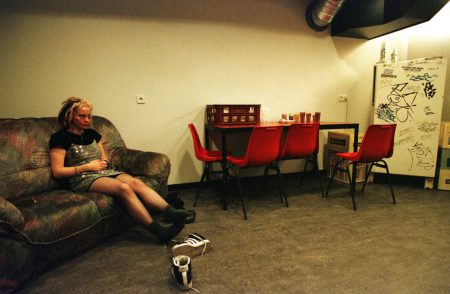
Anneke van Giersbergen in 1999, photo Peter Blok
The little door
I was reading through my first interview with you, conducted for OOR magazine in september 1995. Mandylion was doing great, Strange Machines was sort of a hit single, and things looked good for The Gathering. When we discussed the creative process back then, you told me that you just sat down with the instrumental songs they gave you and wrote the lyrics for the album. Because, you said, the lyrics will come, always. I found that amazing back then, and I am wondering: did that ever change?
“No. (She knocks on the table) I never had writer’s block, I never had the feeling that I couldn’t produce. Because I truly believe that songs or lyrics or melodies or anything that you create, are not yours. Having a great voice, being able to sing… That’s a gift, right? Think about that word: a gift, you got it from… well, the cosmos, you know, the greater thing. The gift is not mine, but I have the responsibility to use it. So, I train my voice, I take everything I do very seriously and all that. But it doesn’t come from me. When I write for an album, I get up in the morning, I make sure that Finn is off to school, and then I sit down at my desk at half past 8 and I start writing. I open this little door in my mind and If there is a need to express anything in particular, I let it in from wherever and let it come out through me. I start writing and a lot of times only after a week I realize what it is all about. I see that the lyrics have rhyme, and rhythm, that there’s enough finesse to them. But there are always layers that I don’t really see when I write them.”
And to write a melody?
“It’s the same with the guitar. I sit down and say: please, let me write some music. And yes, there it comes. I start playing without really knowing what I’m doing. (She laughs.) Of course, a lot of stuff isn’t good enough, just bits and pieces, I know. But still, I guess that is why I never experienced writer’s block. Because the process doesn’t start with me. And it is something that happens to other writers too. Other creative people. It is called inspiration, right? And I don’t mean that you just open a book called ‘Inspiration’. You don’t eat it or drink it. It just… comes. Through you. And I could compare it to intuition, which guides you to a good idea, to insights in bringing up your kids, to where life takes you next. Inspiration, intuition, it is all ideas flowing through you.”
I can imagine that you were writing lyrics with The Gathering with a certain mindset, because of the music of the band. What happened to your lyrics when you started your solo career, and there wasn’t a musical framework anymore?
“I felt the freedom to do whatever I liked. For instance: I started writing in the first person. Much more personal. I never did that with The Gathering. There’s a song on my first solo album about three people in my life that I consider life coaches. I had known them for so many years, they are very close to me and I feel blessed for that fact. So, I wrote a song about them. That would not have been possible with The Gathering, because there I was part of a collective. And I would write more about what we feel, as a group. There were some personal angles, but not too many. That all changed when I went solo. I allowed myself the freedom to write about whatever I wanted. My son, for example. My whole perspective changed, not just the way I wrote my lyrics. Planning, making music, working with other artists and songwriters, the basis for all of my work changed. All these decisions that I could take by myself!”
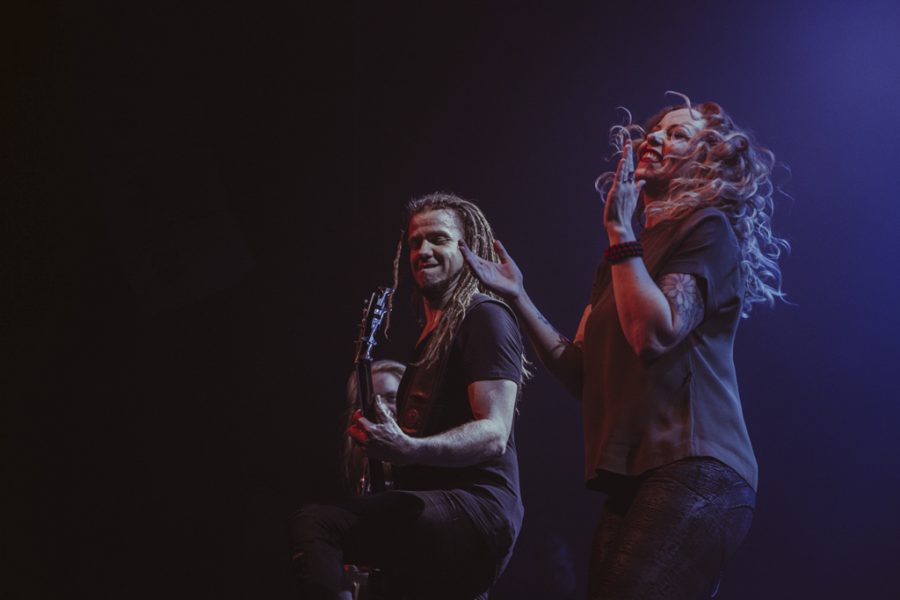
VUUR in Doornroosje, photo Dani Silvia
Feel the song
I am immediately thinking of you guesting on other people’s albums quite often. What do they ask from you, lyrically?
“The funny thing is that most of the times when people ask me to collaborate, they already have the lyrics written. With Amorphis it was like that: ‘We have this song; would you like to sing these lyrics for us?’ And then they expect me to be myself, with my own vocal sound, the melodies and harmonies, I can change the lyrics if I want to, make them more my own. That is all okay. I like to dive into something that is already there, and then make it my own. It’s a different challenge when I’m creating something out of nothing. And it is a fast way of working. I like it a lot. The simplicity of it. All I have to do is enter the song and give it my best.”
And it has always been like that, easy, simple?
“If I don’t like the song, if I feel it’s not gonna work, I won’t participate, of course. A lot of bands ask me if I want to sing on their album. And only a few a year I will pick up. Even if it is a song that most would consider ‘out of my genre’: if I feel it, I will do it. Earlier this year I recorded a power metal song with Timo Tolkki, super catchy, very nice, but definitely something that I would never write myself.”
So, how should I see this, you get lots of emails with requests, with music…
“Yeah, I get a few, haha.”
…and you listen to all, and then you just select what would work?
“Usually I get a request with a song in a demo phase, something unfinished. And I always let them know that I will only do it if I love it. I have to feel the song, otherwise it is no use. When I do like the song, I have them send me the files and I start working on it in my studio at home. Until I am satisfied with it. That’s all there is to it. I love it! And it pays the bills as well, let’s be honest.”
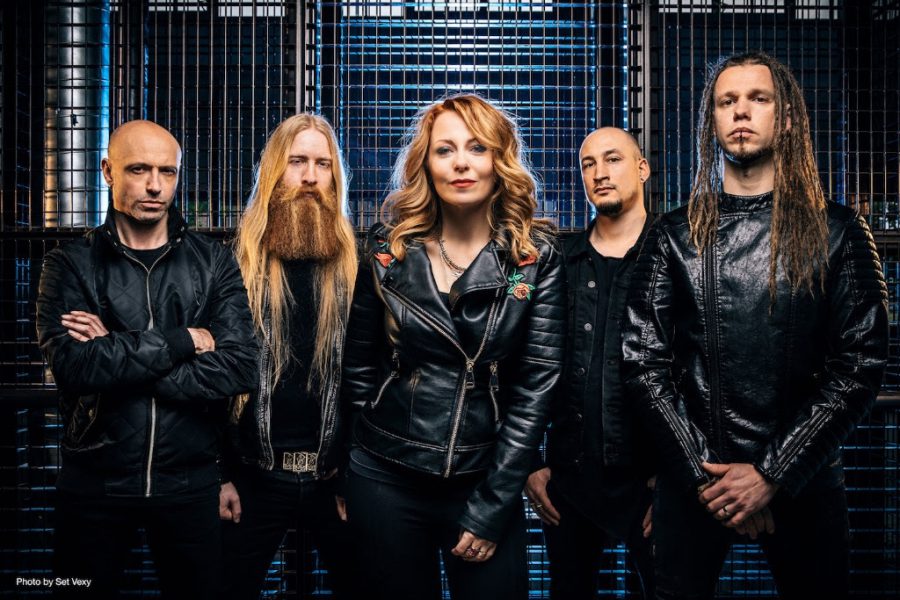
VUUR with Anneke van Giersbergen, photo Set Vexy
Not like The Gathering
Talking about ‘your genre’: I can understand that to the world outside of the Netherlands you can still speak of ‘your genre’. But at home it is getting quite hard to pinpoint what is your genre, actually. It is quite a stretch from metal songs with VUUR to a Christmas special on TV. Is there any limit to what you will do as a singer?
“It is quite a wide range, but for me it is about music and it is about singing. I can understand it is a little hard to keep up with for some. I remember doing a U2 cover song, it was the first time I was on national TV show De Wereld Draait Door. That really got me some attention and drew quite some people to the shows I was doing at the time with Agua de Annique. I wasn’t playing metal, but a pretty heavy rock set still. Too heavy for some people, as it turned out. But that was ten years ago, and it’s become only more diverse. I have my acoustical performances on national television. I perform pop songs with BLØF, and then there are the metal shows with VUUR. And now, people who have seen me in the first two settings are going: ‘I heard she is in this metal band, let’s check that out’. And they actually like the heavy stuff and the guy with the beard (VUUR’s guitar player Jord Otto) and the show that comes with it. Lots of ‘office people’ – for lack of a better description – at the VUUR shows in Holland! Not wearing the black T-shirts, you know, maybe not even into metal, but they like the atmosphere, with me next to the guy with the beard on stage, the pyrotechnics, everything that comes with it. They see it as more of a theater experience, I guess. They are overwhelmed by it. And that is so cool! I am really happy with my broad audience in the Netherlands. Then I see the metalheads at my theater shows, and they even come to the children’s theater shows I did. Bringing their kids – or even coming without kids, haha. So, maybe when you get confused about my career, it is best to say that it is eclectic. At least that’s what I am getting now: that I am eclectic.”
It took you some time, though. I remember that around the time you started Agua de Annique, people really didn’t know what to make of it.
“It did take some time, yes. It has to grow with the listeners. But it had to grow with me too! All these songs I had lying around, written during the time I was with The Gathering, that I was putting together for an album. People bought it and listened to it because they were curious – and then they dropped me. For some time. Thinking: that was Anneke’s solo album and now she will disappear, for she is nothing without The Gathering.”
You cut your hair shorter, had a more poppy image even.
“Yeah. I met with lots of scepticism. Let me fast forward to VUUR, to make my point. Ever since I went solo, people would say: if Anneke will return in heavy rock, it will sound like The Gathering. No matter what I did, recording and performing with Devin Townsend, with Within Temptation, and move around in the metal scene as I always did. I often stated that I would like to have my own band, work on my ideas for songs, who will be heavy, with elements of metal and prog. And people would just think: Anneke + heavy = The Gathering. So, the first album of VUUR is out, and it is way heavier and more prog than The Gathering, and everybody is going like: ‘Ehmm, weird, this is not like The Gathering…’ I never ever referred to The Gathering when I spoke about my metal band! So, on the one hand I think of it as a big compliment, because The Gathering was great and they had a big impact on people’s musical lives. But on the other hand, people expecting The Gathering 2.0 from me? It’s not happening.”

VUUR in 2018 in Berlin, photo Dani Silvia
Nothing like it.
“No, and though the VUUR album didn’t do as well as I hoped it would, and people were reluctant to come see the shows at first, I feel that now people are getting into it. They are listening to what is really going on in the songs, they get the unique atmosphere of the music more. This is all just to say that with every step I take, for me and my brain it’s in the past and I am already two steps ahead again. But it takes the audience one, two years to catch up. After I left The Gathering it took five years to get accepted and fully acknowledged as a solo artist. Which is fine, I don’t mind working hard. And I believe in my own stuff.”
Who came up with the name VUUR?
“I did! At the kitchen table, I was thinking: Agua de Annique, that’s about water… I like the idea of the elements. And VUUR, a cool Dutch word for ‘fire’, is short and energetic. It stands for ‘drive’ and ‘passion’ as well. In English it is cool too, but there are bands like Earth and Fire, Earth, Wind & Fire, Firewind… You just Google for all the names! So then I thought: why not VUUR? In Dutch, so people will talk about its pronunciation. People abroad ask me about it, it’s a name that works.”
Dead-honest
You are moving in a totally different music business than ten, fifteen years ago. Think of all the new music that can be accessed easily by everyone, think of people’s zapping behaviour…
“True, the way music is perceived has changed a lot. Spotify happened, and so much more. But I don’t think that is necessarily a bad thing. You find your music worldwide available, people have the possibility to check it out. And they buy, too. They go for the vinyl, after checking a few tracks first. And we even sell quite a few CD’s still, so I am not complaining. But you have to adjust to new demands all the time. How are we getting our music out there? That will change next year, and the years after again.”
When you joined The Gathering in 1994, the band just got signed by Century Media Records. Now you are signed to their affiliate label InsideOut Music with VUUR. Are the same people still working there?
“Some of them are, yes.”
It was drummer Hans Rutten who told me at the time that Century Media were good for The Gathering, because they were able to help the band find the direction they needed. A more professional approach as well, maybe. How much of that do you remember? And would that be something that you look for in a label nowadays still?
“It has changed a lot. The record label, to me, is partly like a bank. It is important to me that I get a certain amount of money in advance, when I start making an album. Can I pay my studio, can I pay my people – that kind of assurance is what I need. It’s an advance, so of course I must sell an X amount of albums to pay back the money, before I start earning something. And besides that, the label should have the right distribution channels. Those basic things I demand from a record company. InsideOut Music and Century Media Records are connected to Sony Music, because Sony bought Century Media at a certain moment in time. Which is cool, because with Sony in the background, I have an even better distribution network, and I can be sure that the online reach is as good as it gets. Another thing: Thomas Waber, the founder and CEO of InsideOut Music, is a real nice guy, as honest as can be. Not many people in this business are honest, but Thomas is. Dead-honest. He advises me, when necessary.”

VUUR in 2018 in Berlin, photo Dani Silvia
When, for example?
“With VUUR we did a support tour that didn’t go as well as I had hoped it would. And that made me a little panicky, for I put all my energy, my money, my creativity in that project. If it would fail, I felt that I would have a huge problem. Yes, also financially. So, he came out on tour, and we talked for a couple of hours. What if the audience doesn’t understand this music, I said? Because I believed in it, but everybody expected it to be something else… As I mentioned before, some people were going ’It is not like The Gathering’, that sort of stuff. And the guys in the band, they depend on me… But then Thomas told me to relax, to just sit still, do what I have to do, and give it time. Because these things need time.”
But the older you get, the more impatient you get, right?
“Yeah! And I am super-impatient. Time is whizzing by, and there are other bands with great singers, who are younger than me, and whoa… But Thomas, man… I am with InsideOut Music because of Thomas, ultimately. A guy like him you don’t meet very often in this business. And his advances aren’t even that big, haha.”
Coming home
Have your parents ever told you what it was that caught your ear first?
“Well, that was my brother, playing the recorder at home, after his lessons at school. I would love it so much if he would play it right in front of me. Like, live music, not coming from the stereo! And I would take the thing from him and just learn what he had played. By ear. And I learnt faster than him, mind you. I must have been five or six years old, and I guess that was when I first realized that sounds could make you feel good. So, surely my mom had me study the recorder too. And all the while, my parents were playing The Beatles and The Rolling Stones on their stereo. A lot. And a lot of classical too. Grieg, Mozart, Bach. Beautiful music! And then there were the albums of Russian men’s choirs, very beautiful as well. Of course, it took only so long before I started to discover music by myself. The Top 40 was discussed at school, you know how it goes. Then my uncle gave me my first guitar. I must have been eleven years old. A beaten-down guitar it was.”
Was that because you wanted it? Did you realize that you wanted to play the guitar?
“No, I was always occupied with music. Listening, dancing, singing. And my uncle, he bought a new guitar and just gave me his old one. So, I started playing it, all the time.”
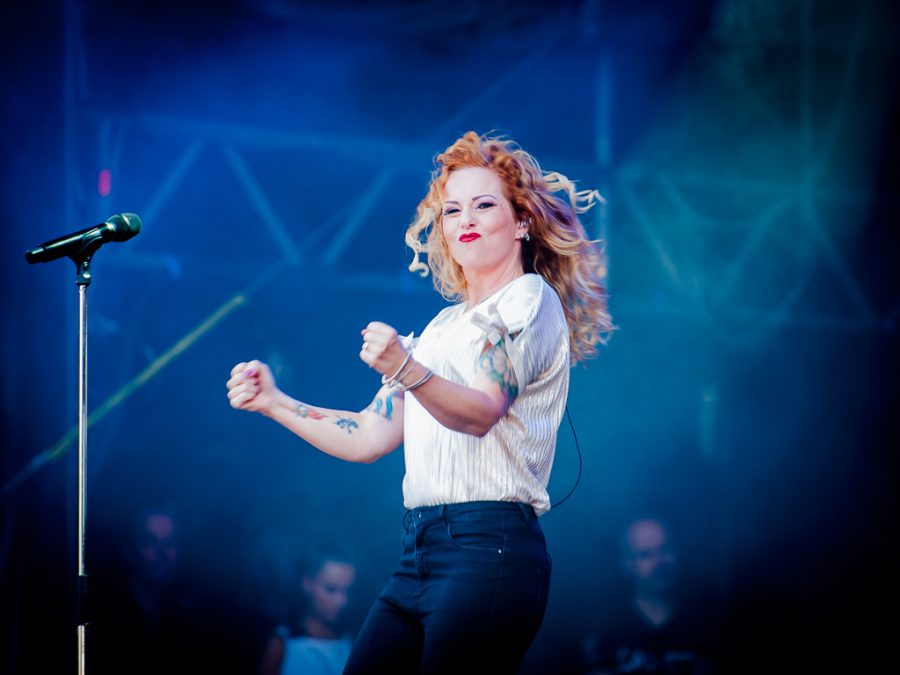
Vuur at Dynamo Metal Fest 2018, photo Roy Wolters
And then, what was your first ‘rock moment’?
“Ha, my brother again. Big inspiration. He listened a lot to progressive music like the Alan Parsons Project and Genesis and such. And a bit of metal too, melodic stuff like Iron Maiden. I thought that was all okay. I was about fourteen, fifteen by then. I was impressed by Iron Maiden, and by Faith No More because of their singers too. Such great singers, with huge voices. And some of my friends, they were listening to the early thrash bands like Anthrax, Slayer and Metallica. And that sound did something to me… Heavy music, dark lyrics, like Slayer, who were singing about the devil, you know, and these random guitar solos! It was all so new to me and I loved it. It felt like coming home. At the same time I kept playing the wonderful singers that I used to listen to, like Ella Fitzgerald, and Barbra Streisand and Diana Ross. The combination of all that music got me hooked.”
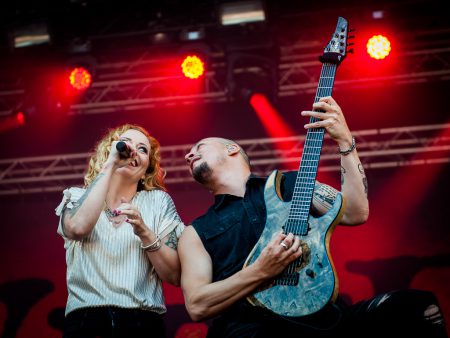
Vuur at Dynamo Metal Fest 2018, photo Roy Wolters
When you say that thrash metal felt like coming home… Do you mean that it brought some balance to your taste?
“Well, yeah, because I liked a lot of the Top 40 stuff, like Madonna for instance. I loved singing and dancing to it. But the moment there was some darker song on the radio, like a sad ballad or a heavy rock song, I would always connect. My brother’s prog rock already had the guitar solos, the intricate drum parts, and I was drawn to that. But that was before I heard metal. Then we got that radio show, VARA’s Vuurwerk, on national radio. That hour was holy to me.”
Her Streisand thing
Tell me a bit about your duo, Bad Breath.
“That was in 1992, until ’94… We had our own songs and it was quite… eclectic, haha. We did some Bootsy Collins cover songs, because we were way into funk music too, at the time. We did Frank Zappa, we did King Crimson, as a duo. Are you familiar with Frank Zappa’s G-Spot Tornado? There are some totally unplayable parts (she sings away), originally done by an orchestra, so we decided to do that one a capella.”
Right. Good idea.
“Haha, it was rather stupid. But we had our own songs too. And Deniz, who was also my boyfriend at the time, had a really great voice. We did some great harmonies. Without an audience, basically, for it was all way too weird. But we did a demo. It was cool. Still love it!”
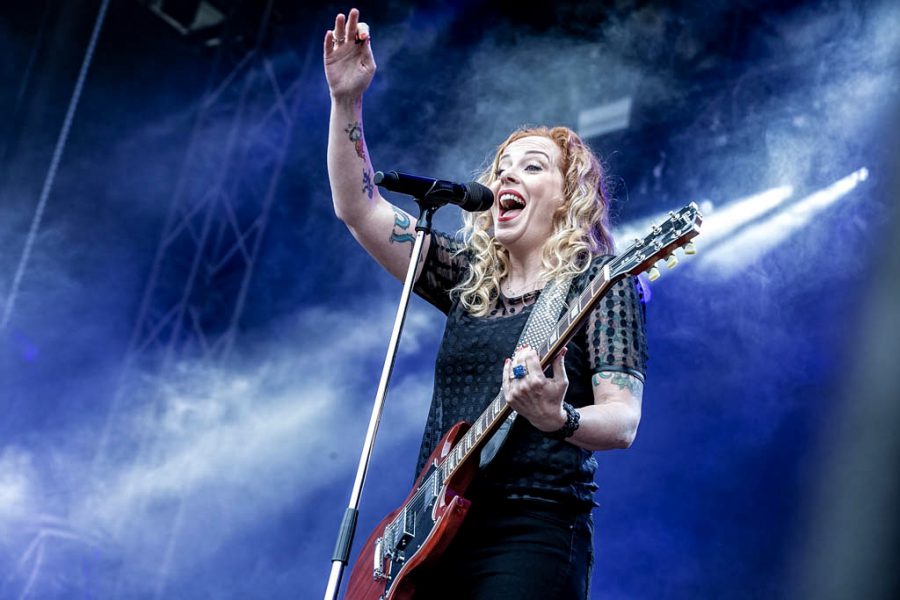
Vuur at FortaRock 2018, photo Rob Sneltjes
I was wondering about the guitar playing. You started quite early with that. Were you mirroring yourself to the singers from the metal you heard?
“No, like you said, there were no girls in metal at the time, so I took inspiration from singers like Barbra Streisand, Ella, singers who have the tendency to sing long notes and to be lyrical about their vocal lines. I love that. So, when I started with the Gathering – I was in a speed metal band before the Gathering as well – I just did my Streisand thing. I love singing loooooong notes and being dramatic, because there wasn’t anything like that in metal. I had to invent and, in the end, just be myself. I made up something that I thought was cool, which was that.”
Did you have any formal training by that time?
“I started vocal lessons when I was fourteen and did that for a long time. And then we went on tour and it kind of watered down, the frequency of taking lessons. Early on I had established my techniques.”
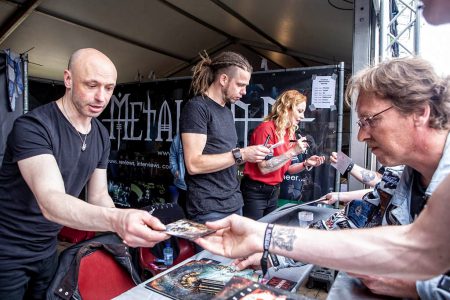
Vuur signing at FortaRock 2018, photo Rob Sneltjes
You never questioned your way of singing or asked yourself if you needed to take better care of your voice? Develop it in a different way maybe? Many singers do, eventually.
“No, I think because I had my lessons early on – my basics and technique – that I know what I can do. I know my voice and my body. Obviously sometimes you get ill and you can’t sing for a while. But, in general, like you asked, I have never had to change anything about my vocal technique or how I go about singing. My big challenge is always taking care of myself. My instrument is in my body. That’s why I’m always jealous of the guitar players. They put their guitars away and drink beer all night. I can’t. When I’m on a tour of three or four weeks, I allow myself two drinking nights out, if I feel good. And if I feel tired or ill, I can’t even do that. I sleep too little and I could eat better. We have such a random life, even when we’re at home, no week is the same. My life is random. My music is random, but my life is also random.”
You are smiling and you look totally happy when you say that. Would you want it any different?
“No! (she laughs) Sometimes it gets me into trouble, and I overstep my own boundaries all the time. I am doing all this stuff, I like working, I like doing projects with other people. I have a lot of things going on. Rob always has to try and slow me down, because you can’t always do everything at the same time. You need time and energy and you need to sleep from time to time. So he keeps me grounded. If I didn’t have Rob, I would be all over the place, I’m afraid.”

Vuur at Dynamo Metal Fest 2018, photo Roy Wolters
Let it all go
Can you tell me what age did to your voice? Do you have thoughts about that?
“Yes. I think I have a strong voice – you’re either blessed with that or not. Some people kill their voice when they get older. I’m old, I’m 46, but I’m not that old. I’m curious what I will sound like when I’m 60 or 70. Because Ella Fitzgerald sang until she dropped dead, you know? The only thing I know is that my stamina has gotten less. With the shows, sometimes I feel like if I could sleep a little bit more, this would be easy. I’m straining with some shows now. I’m also very lazy with warming up my voice and cooling down my voice. I don’t do that, and all the other singers are always like ‘Whaaat?’ For me, I think, it’s good to relax before the shows. I do the make-up, that’s relaxing, a bit of an inward moment. Doing my own make-up is really a part of the whole thing. You can be quiet; you don’t have to talk so much. And then I just say a little prayer. Before I go on stage, I say something to myself, like: ‘This is going to be the best gig of my life’ – even if it’s for twenty people or a living room setting or whatever. ‘My body is in line, my vocal systems are in line, I have the energy flowing, I’m in a good mood, we’re all going to do this thing together’. Stuff like that. And when I step on stage, I try to let it all go. Maybe I will forget a lyric or something, but I try to let it go and forget about it and just do it. I hardly ever worry about my voice. All the other things I can worry about, but not that.”
Then you step onto the stage and then… what? Do you think of past shows?
“I’m usually very much in the moment. That’s what I told you before, about not looking back or forward: I really enjoy everything the most when it’s in the moment. The ultimate thing is performing, because it’s in the moment and you’re with those people, there, at thát moment. You just have to do it, it’s your music, and then they react, and you react. I usually call it a ball of energy, where we are in at that moment. A big bubble of peace, love and energy, and I love being in there, totally love it. I don’t think about later, I don’t think about the next song, I don’t think about when I was in the dressing room. I think that’s when you get the best results: when you’re in the moment. Because then you can really focus on what you’re doing. And then you’re good, I think. Even when you forget a lyric: it doesn’t even matter.”
When you get a lot of reaction from the audience, does that change your performance? Are you more aware of what’s happening then?
“Yes, because if you’re in the moment, you’re not playing for yourself. You’re doing this thing together. How they react, will influence your performance. If nobody cares – sometimes when you’re at a festival in the afternoon and there are bigger bands in the line-up – it’s a different thing, surely. But even then I think: ‘Yeah, we’re really good, we’re a really good band and I’m really going to win.’ And usually that works. If you go out like ‘I’m going to get you’, then people are like ‘Whoa, I don’t like metal, but I like this!’ Standing there with a beer, or hanging with their whole family, surprised about what they are looking at. Because maybe they’ve never heard a metal band in their lives. And then I try to get them anyway, that’s part of the fun, you know? You don’t just do your thing and go home.”
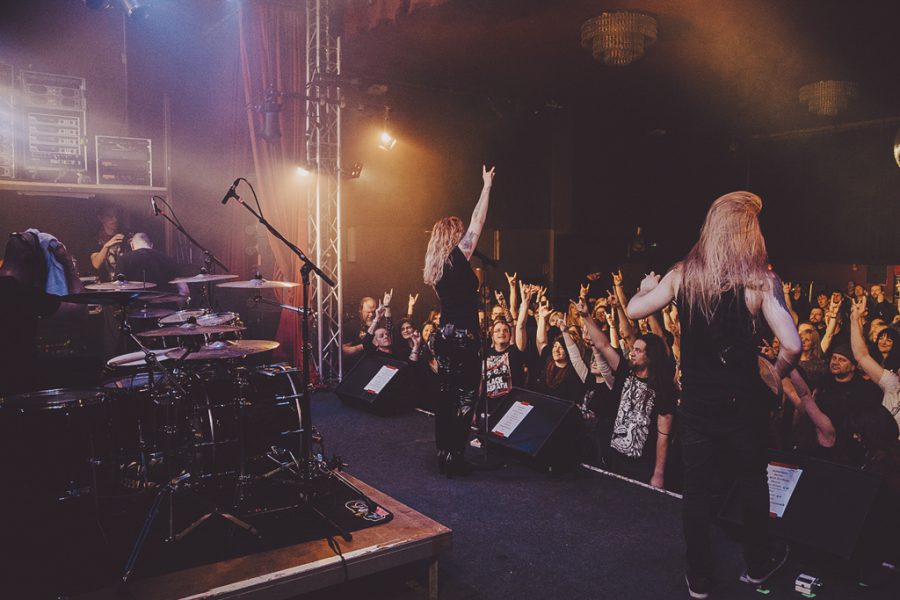
VUUR in 2018 in Berlin, photo Dani Silvia
A much harsher crowd
Still, you must have expectations sometimes when you’re on tour. For instance: this autumn you will be playing in the States and I see some of these venues, like Irving Plaza in New York. They are iconic. What are your expectations with a place like that? Can you go into a concert there with a quiet mind, or is it different?
“It’s a good example you give here, because people in Amsterdam and the capital cities are much more spoiled than people in the countryside, you know? They go like: ‘Woohoo, they’ve come to perform for us!’ In Amsterdam they will be reluctant, and then, after two or three songs, they will approve, and they’ll just go for it. It’s funny, almost. In New York, people have a big mouth. They shout whenever they do like it, but also when they don’t like it. It’s a much harsher, more honest crowd, and that’s the same in certain other cities in the States as well. But I like it. If you feel uncertain about things, they can kill you. So you better come with a good show and a good attitude. You have to be able to sing well, play well. Sometimes I’m not so super good on the guitar and I make mistakes and then I’ll get angry at myself for that. But I keep practicing and try to be as good as I can be. Having a good attitude helps. But you have to be reeeaaally good in some cities; no mistakes are allowed.”
Then there is television. Are you comfortable with tv appearances?
“In some ways, television is not cool to do. Everything you do is squeezed in a few minutes, there’s a lot of people watching and usually it’s live. It’s killing.”
Like at De Wereld Draait Door, the Netherlands’ prime time favourite?
“I never hated the one minute at De Wereld Draait Door, because it was a challenge.”
What do you need the challenge for? I can understand that when you’re in it and you’re asked, it’s very important.
“Oh yeah, you have to do it. I know a lot of musicians who are awfully angry about the one-minute performance. But I think that show gets you at least a million viewers and you can show them a snippet of what you’re doing. Hopefully that triggers people to check out more. But if you’re a music lover – like we are – and you’re in front of the television, you might think “Too bad it’s only one minute, I could’ve listened to the whole song. That’s a good song.” I agree with that as well. But I’ll never be angry towards those guys, because I love to be doing the minute, haha. Television is nerve-racking, though. People in TV and radio are all so fast, they’re fast thinkers. I’m a slow thinker, therefore I always suck at doing interviews. I think too long about my answers, and my answers are too long. In this one, here and now, I can be myself. But on television… I see people’s attention drift off and then I have to sing a song – one minute, or things I’ve never done before, like Christmas specials – and it’s quite stressful. But still, when I do it, I love it. And usually I’m really proud of it too.”
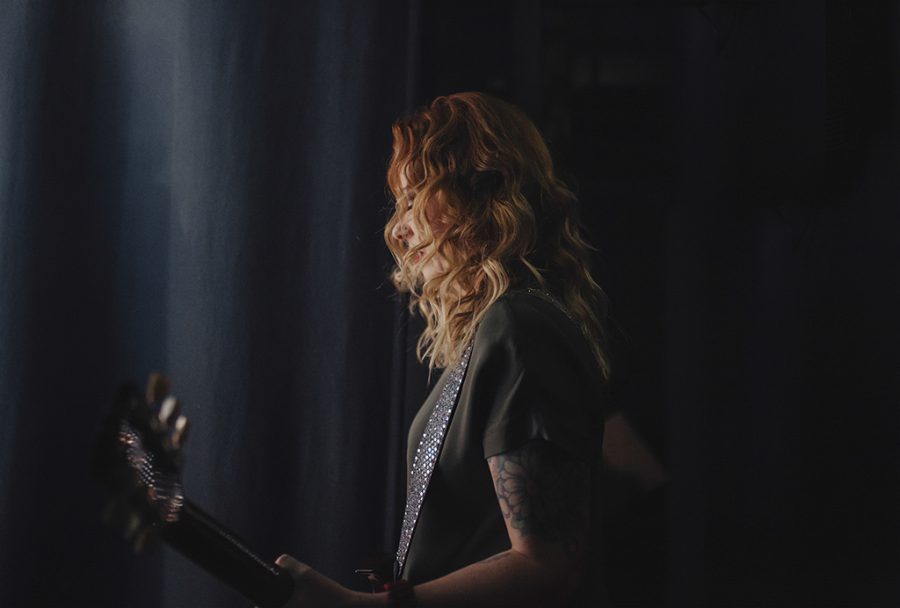
VUUR in Nijmegen, photo Dani Silvia
A slow process
Do you ever think that your performance in these TV shows has given you unexpected fame and visibility?
“Yes, I do. I never realised that this was a level to be on. Because when you are young and completely unknown, you think in terms of ‘Madonna-size fame’ or something like that. You never think about anything in between. And then you go about your career, and every time you take a new step and get recognition, it is an indication of where you are. Being asked for a television show, or how often you are recognised in the streets, can be an indication that you reached a new level of fame. I don’t mean this literally, of course. I get recognised a lot in the rock scene, but when I go to (department store) HEMA, almost nobody knows me. Then, if four people in HEMA know your name, it shows that you’re growing. Next year, maybe there’s eight of them. It’s a slow process. And sometimes I am aware of reaching a new level. At present I’m asked, sometimes begged, for appearances and shows and bands different than I was three years ago. So, yeah, there are many levels and I feel like every year or every two years I take a little step. And I love that I’m growing, it doesn’t matter how fast, but I’m growing. So I can keep doing what I do.”
I know a few people who have a hard time digging BLØF…
“Sure… but they write really good songs! I sang on Porselein, isn’t that a great song?”
You touched upon more folky elements when you guested with Amorphis and Árstíðir. Did you ever consider digging into the Dutch folk music of long ago?
“No, not really. Sometimes I sing songs written by Gerard van Maasakkers, in the Dutch language and the dialect of Brabant. I enjoy that a lot, because it takes me close to where I come from, to where I grew up. And I love singing with Amorphis and I love the folk elements in some metal, like the flutes and stuff. But that kind of music doesn’t come from me when I write.”
With the Christmas show, I was thinking: ‘I really hope she loves what she’s doing.’ Because I really can’t relate to that anymore.
“Haha yeah, I know, and I love it. Everyone is like ‘Huh?’ Eric van Tijn discovered me a while back and he’s producing the music for The Passion and lots of big shows for television. That is why I was asked to do the Christmas show for TV. I could pick the songs that fit me. I never do something that isn’t me, that I can’t pull off. Which means that I felt very comfortable with what I sang. But it’s all about God, so people in my scene and also some bandmembers were like ‘Fucking hell, what is this?’ And they didn’t even watch it, because they never watch television! When I explained what it was about for me, they understood. Yeah, it’s music, man. I get to sing on TV. It’s awesome.”
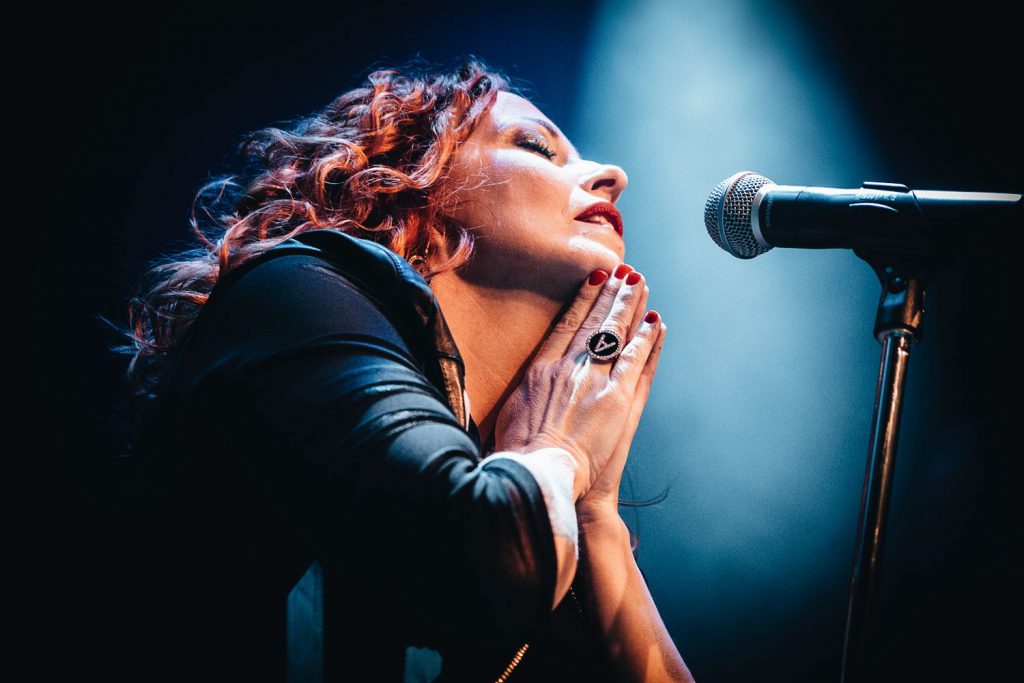
Anneke van Giersbergen with The Gentle Storm in Nieuwe NOR, photo Dani Silvia
Be sure to read Part 2 of A random life – 25 years of Anneke van Giersbergen
In the second part Anneke discusses being a mother and a rock singer at the same time, why she likes her rock scene masculine, the genius of Devin Townsend, the super-coolness of hearing your own voice in the rides in Dutch theme park Efteling, and her social media approach. Also, for the first time ever in an interview, Anneke comments on her leaving The Gathering in 2007.
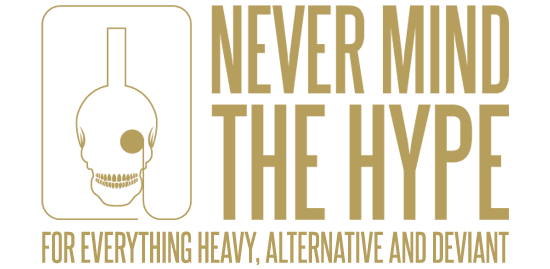
Nog geen reacties!
Er zijn nog geen reacties geplaatst.